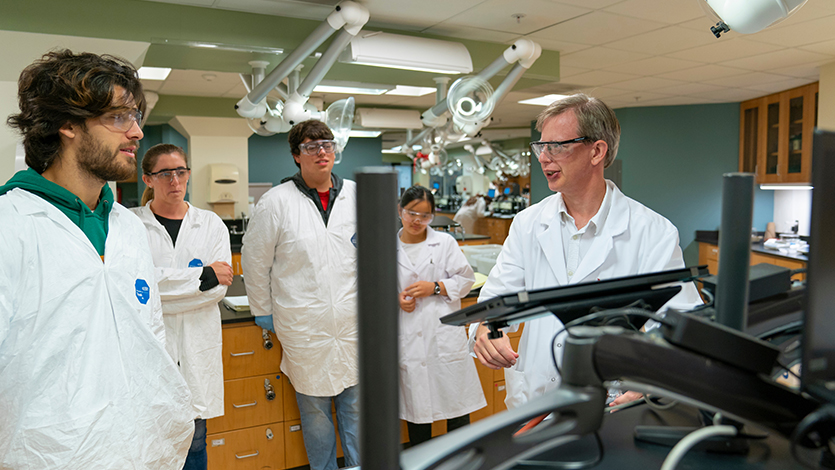NSF Grant to Support High Achieving STEM Majors with Financial Need

January 24, 2022 — Marist College’s School of Science has been awarded a $1,480,254.00 grant from the National Science Foundation to support high achieving low-income students in STEM majors. This project, entitled "Gateway to success: combining financial, academic and psychosocial supports to promote academic success of low-income STEM majors," was spearheaded by Dean of the Marist School of Science Alicia Slater and Associate Dean Neil Fitzgerald.
“This grant is a major milestone for the School of Science and a valuable tool in our efforts to help all students reach their full potential,” said Alicia Slater, Dean of the Marist School of Science. “It is our hope that the programs we begin for the S-STEM scholars will promote the academic success of all low-income students in the future." More information on the grant is available here.
The overall goal of the project is to increase STEM degree completion among high-achieving undergraduates with significant financial need. In particular, the project will allow students to focus on academic success and improve student performance in gateway STEM courses. It includes strong mentoring and career planning support while fostering a sense of belonging to both the campus and community and adding to the professional formation of students’ science identities.
“Expanding educational opportunity is one of our very highest priorities,” said Kevin Weinman, President of Marist College. “This grant increases Marist’s ability to attract, enroll, and retain a diverse group of talented students regardless of their financial circumstances, and we are grateful to the NSF for recognizing the importance of this work.”
Over its six-year duration, this project will cover all billable charges for a total of up to 23 full-time students or ‘S-STEM scholars’ pursuing undergraduate degrees in biology, biochemistry, chemistry, or environmental science, as well as a laptop, and research and travel funding. Students will participate in a funded summer bridge program, take gateway classes as a cohort, reside in a living-learning community, have dedicated faculty advisors, and be provided with experiential and employment opportunities to reduce financial need and provide valuable discipline-based experience.
“This grant is a powerful means of promoting success of STEM majors at Marist and ensuring that socioeconomic status will not be an impediment to a student’s academic achievements,” said Dr. Thom Wermuth, Vice President of Academic Affairs.
At Marist, the S-STEM scholars will learn in student-centered, state-of-the-art facilities housed in the Science and Allied Health and Donnelly buildings. Biology, Biochemistry and Chemistry students will have the opportunity to work in new or newly renovated teaching and research laboratories that include modern instrumentation. Marist’s location on the Hudson River and River Lab housed in the Cornell Boathouse provide impactful experiences for students majoring in Environmental Science.
All S-STEM scholars will also take Marist’s liberal arts core, reflecting Marist’s commitment to developing well-rounded students who are prepared for the global community of the 21st century. Marist’s dedicated faculty take pride in mentoring their students, partnering with them to conduct research, and providing academic and personal support.
This project will have a significant, long-term impact on STEM majors at Marist. The results of this important work will be shared at regional and national conferences and in peer-reviewed publications.



